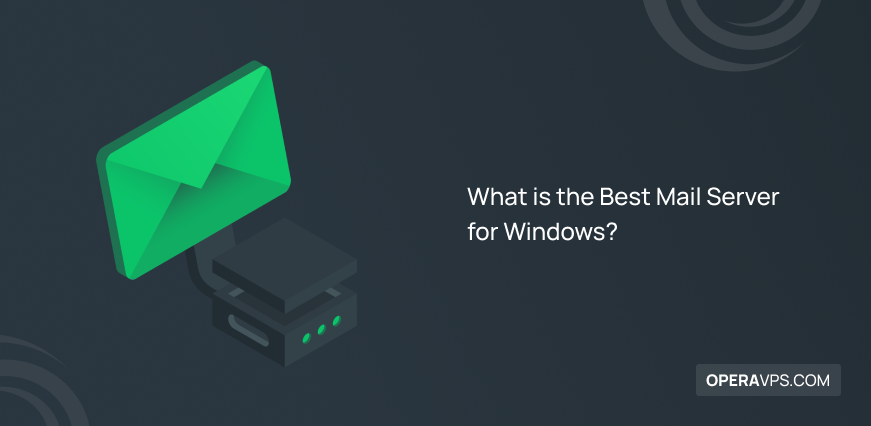
What is the Best Mail Server for Windows?
In recent years, email has made a significant transformation in the era of communications and is recognized as an electronic mailbox in the online space. Today, with the advancement of technology and numerous ways to connect via the internet, email maintains its popularity and position among other communication services. To the extent that, despite the numerous options available for communication, it is impossible to eliminate email and replace it with a new program.
You most likely have experience creating a personal email account, typically using web-based email services such as Gmail, Proton Mail, and Outlook for sending, storing, and receiving email messages. But have you ever thought about what happens in the background of the email service that enables you to send or receive an email message quickly?
When sending an email, the email message passes through several mail servers to reach its final destination. A mail server is a powerful engine that allows sending/receiving text messages, images, music, videos, etc., in just seconds and with just one click from any point in the world.
A mail server is a computer system responsible for receiving, sending, and storing email messages for the intended receivers. As the central hub, the mail server manages the transfer of messages between the sender and the receiver, enabling email communication between individuals and organizations. Moreover, nowadays, establishing a business and taking steps to expand it in the professional world is not feasible without dedicating a mailing system to the business website, and setting up a website domain email has become a necessity. For this reason, small to medium-sized businesses are required to set up an email server as a resource for data management, configure their email infrastructure, and ensure privacy.
As we have already introduced the Top 15 Linux Mail Servers, this article targets Windows users. In this article, we will explain Mail servers and introduce 10 of the best Mail server for Windows. This article aims to assist you in selecting the best windows Mail server for your professional activities without spending a significant amount of time evaluating and researching the available Mail servers.
Everything About Mail Servers
There are various definitions of mail servers, all of which indicate that a mail server is a server responsible for managing and facilitating the exchange of email messages. In the process of email communication, the mail server plays a crucial role in directing messages between the sender and the receiver. Unlike clients such as Gmail, which you use to manage email messages, a mail server is not a client. Mail servers direct and manage email messages in the background and ask clients for help receiving and sending messages between sender and receiver.
As a result, mail servers constitute essential components of the infrastructure and cloud section of the email system. At the same time, clients are the software part of this system, providing a user-friendly interface for users to access and manage their emails. However, what is the primary function and advantage of using a mail server? We will discuss this further below.
- Receiving email
When someone sends you an email message, the mail server of the sender’s domain communicates with the mail server of the recipient’s domain to facilitate the exchange of messages. This allows the recipient’s email server to receive and store the message for you to view by accessing your mailbox.
- Email Storage and Management
The email server, by segregating the email messages of each user into separate mailboxes, provides the ability to manage, retrieve, and organize your emails within your mailbox.
- Email Delivery
In the background of directing and transmitting email messages, powerful email servers are responsible for directing and sending messages. As a result, email servers play a crucial role in properly sending and delivering messages to their intended destinations.
- Security and Spam Filtering
Protecting email and critical business information against cyber attacks and hackers is crucial. The mail server, by supporting advanced security features such as spam filters (protecting users from unwanted and harmful emails) and encryption protocols like SSL/TLS (preventing unauthorized access to email information through email encryption), ensures the secure transmission of messages.
- Advanced Features Provision
Cloud storage allocation, control over incoming and outgoing emails, protection against spam emails, message management, and calendar sharing are features provided by the mail server.
- Customization
Setting up mail servers not only guarantees secure data exchange and privacy protection but also offers the ability to customize according to the needs of your business. As a result, companies can customize their email interface based on their requirements.
- Email Protocols
Mail servers utilize standard communication protocols such as SMTP (Simple Mail Transfer Protocol) for sending emails, IMAP (Internet Message Access Protocol), or POP3 (Post Office Protocol version 3) for retrieving emails, and others for additional functionalities like authentication and encryption. Email protocols define rules and agreements for establishing communication between clients and email servers, managing and exchanging messages. They are crucial in ensuring consistency in collaboration among different email systems.
Email servers are classified into two main types:
Inbound Mail Servers: These servers are responsible for receiving incoming emails from other email servers on the internet and delivering them to the appropriate recipient’s mailbox.
Outbound Mail Servers: These servers manage outgoing emails, establishing communication with the email server of the recipient service and sending the message to it.
This section discusses everything you need to know about mail servers. Now, armed with comprehensive knowledge, you are ready to choose the best mail server for your needs and objectives.
If you prioritize the security and privacy of your business, the ideal approach is to set up a private email server for your business. Since, for various reasons and the familiarity of most users with the Windows environment, the Windows operating system is a good choice for setting up a secure and high-quality email server, you can buy Windows VPS according to your needs and start setting up an email server on it. You will become familiar with the best windows mail servers in the following sections. Before introducing the best mail servers for Windows, let’s become acquainted with the features of an ideal email server.
What Features Should the Best Mail Server Have?
Choosing the best mail server varies based on the specific needs and preferences of users or organizations, but key features that the best email server should possess are as follows:
- Simple setup process and user-friendly management interface
- Support for MTA (Mail Transfer Agent) to manage outgoing emails for multiple users
- Support for MDA (Mail Delivery Agent) to correctly redirect email to the inbox.
- Use of standard email protocols such as SMTP, IMAP, and POP3 to ensure compatibility with a variety of email clients
- Provision of features such as spam filtering, antivirus scanning, and authentication mechanisms
- The ability to securely authenticate users and manage access control with support for features like password policies, account locking, and defining user roles and permissions
- Active community forum and community-based support when choosing a free email server for development and continuous updates
- Availability of comprehensive documentation and support resources, including forums, guides, and FAQs, for troubleshooting issues and optimizing server performance
10 Best Windows Mail Servers in 2024
Choosing the best mail server depends on your specific needs and preferences. Here, the most popular mail servers for Windows are introduced:
1. hMailServer
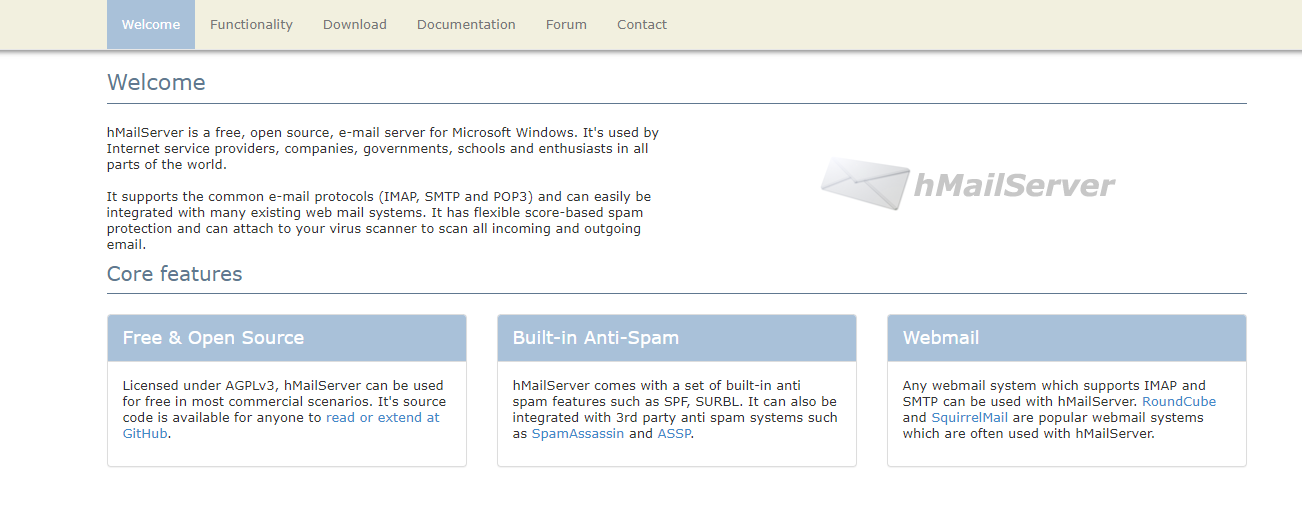
If you are looking for a free and open-source option for your email server, hMailServer is an ideal choice. The open-source nature of hMailServer means that its source code is freely available on GitHub for development and coverage of various business scenarios. hMailServer supports standard protocols such as IMAP and SMTP, and it is compatible with email systems that operate under the support of these protocols.
hMailServer is renowned for its simple user interface, making it easily installable and usable. Therefore, it is suitable for beginners in configuring and using a mail server.
hMailServer provides internal anti-spam features such as SPF (Sender Policy Framework) and SURBL to enhance email information security. Additionally, hMailServer supports the SSL encryption protocol, which makes it one of the best mail servers for small to medium-sized businesses. Security is always a critical issue for any business; the pre-configured security tools of hMailServer ensure the security of your server without the need for your active intervention. This gives you confidence that the server will not be used for sending spam messages.
Features such as mail backup capability, MX backup, virtual domains, customizable settings, virus scanning, and more make hMailServer the top choice for Microsoft users. The COM library of hMailServer supports integration with third-party software, such as existing IT systems or antispam systems, to enhance its functionality.
Advantages:
- Free
- Open-source
- Easy to use and set up
- Cross-platform compatibility and flexibility in integration
- Support for standard protocols (SMTP, IMAP, and POP3)
- User-friendly interface
- Spam Protection, including support for DNS-based Blackhole Lists (DNSBL), Greylisting, and SPF (Sender Policy Framework)
- Security Features such as SSL/TLS encryption
- Benefits from an active development community
Disadvantages:
- Lacks advanced features found in commercial and enterprise solutions
- Only compatible with Windows
- Relies on a graphical user interface (GUI)
2. Zimbra
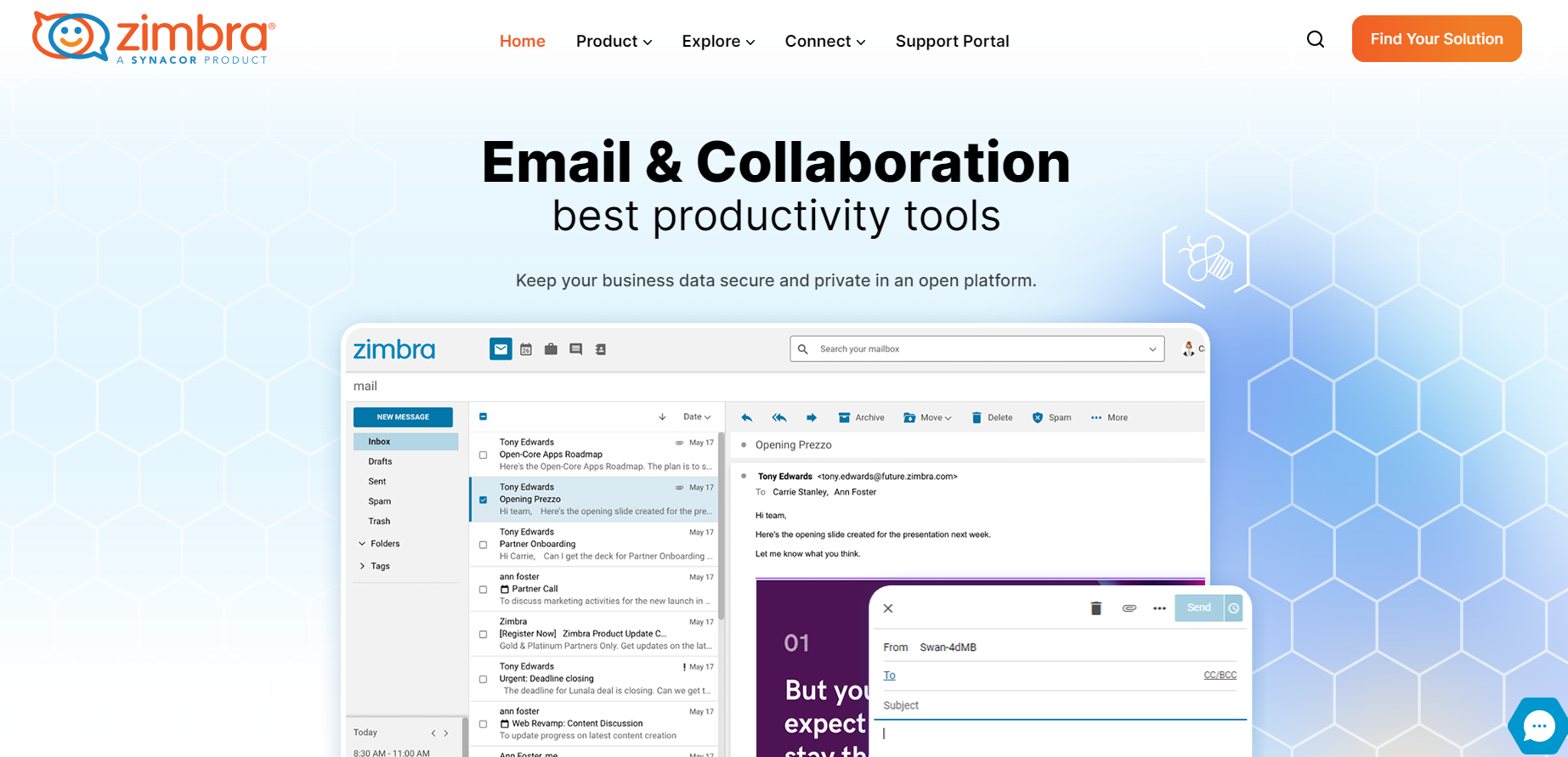
Zimbra is an open-source and collaborative email server designed to meet the collaboration needs of Microsoft users. Zimbra is tailored to cater to the requirements of businesses, educational institutions, and service providers. Zimbra is known for its collaboration features among email servers, and it supports the commercial version (Zimbra Network Edition) with advanced features in addition to its open-source version.
Zimbra also supports standard protocols such as POP3, IMAP, and SMTP, providing features like enterprise-class, contacts, email, calendar, and collaboration services. Regarding security, Zimbra leaves no room for concerns as it supports SSL encryption protocols and SPF anti-spam systems. Zimbra is available for desktop users on Windows 10 and other operating systems; furthermore, migrating from other email servers to Zimbra is straightforward and exciting. With Zimbra, you will have the most innovative digital communication experience.
Advantages:
- Open-source and feature-rich collaboration suite
- Supports email, contacts, calendar, and more
- Compatible with Windows and Linux operating systems
- Versatile and compatible with different server environments
- Provides a Web-Based Administration Console
- Supports the Open Source Edition
- Ajax-based Webmail Interface, offering a responsive and interactive email experience within a web browser
- Supports security features, including SSL/TLS encryption, anti-spam and anti-virus filters, and two-factor authentication
- Compatibility and integration with third-party applications and services through Zimlets
- High availability and clustering
- Supports Outlook integration
- Active community and commercial support
Disadvantages:
- Complex installation and configuration
- Resource-intensive, requiring meeting system requirements in the server infrastructure for optimal performance
- Dependency on the commercial version for advanced features like high availability and mobile sync
- Limited native Outlook integration in the Open Source Edition
- Rapid update cycle and introduction of new features that may pose challenges.
3. Kolab Groupware
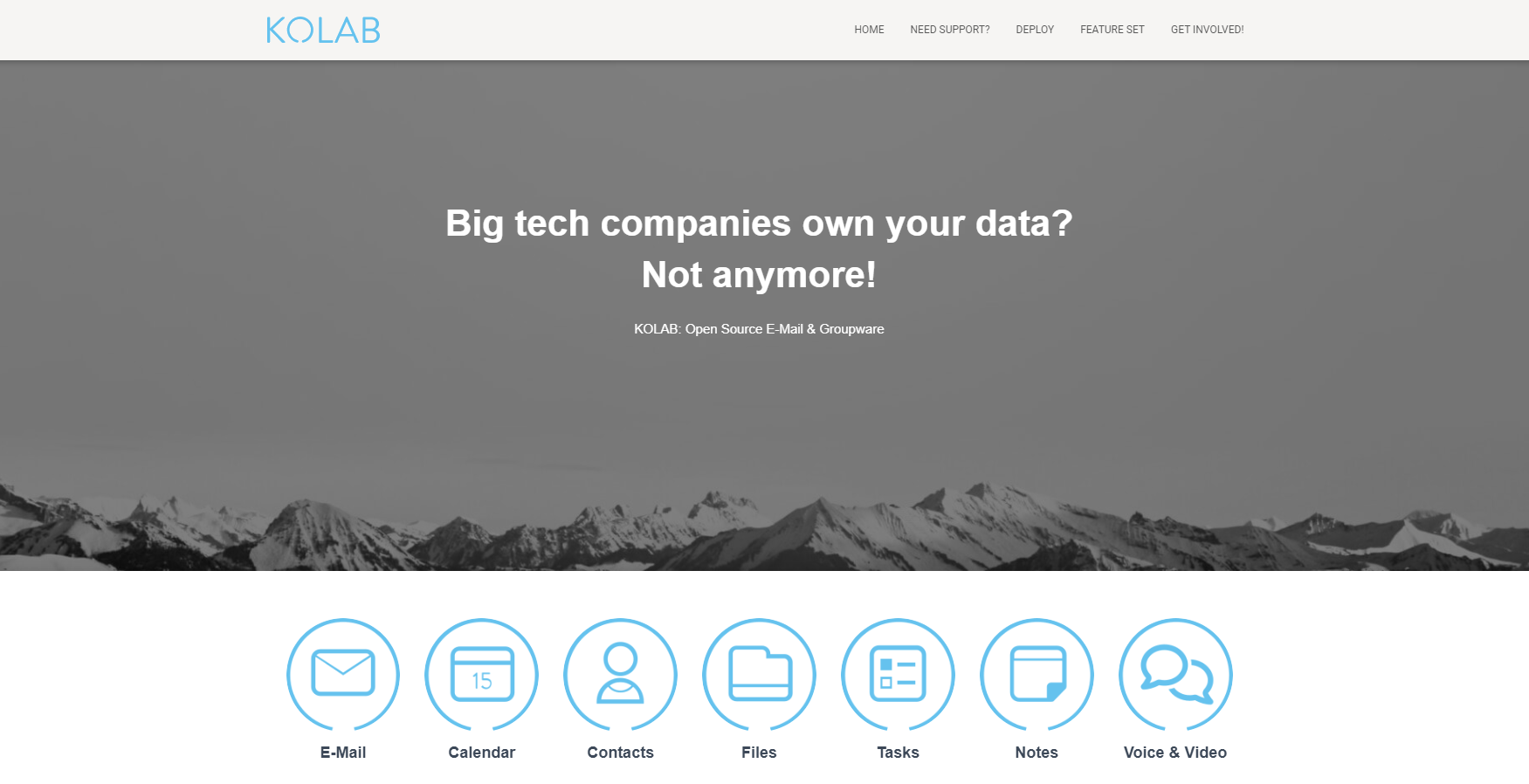
Kolab is an open-source groupware suite and comprehensive solution for communication and collaboration designed for organizations, businesses, and service providers. Features such as ease of use, reliability, support for collaboration tools, email services, and calendaring distinguish Kolab Groupware from other email servers, making it one of the best email server options.
Kolab is compatible with most clients, including Roundcube web frontend, Mozilla Lightning, Mozilla Thunderbird, and KDE PIM-Suite Kontact. It is designed for integration with other applications and services, making it a flexible choice for organizations with diverse software ecosystems.
Kolab provides a feature-rich email system with support for IMAP, POP3, and SMTP protocols. Additionally, this platform includes a calendar system supporting events, meetings, and scheduling. It allows users to manage schedules, set reminders, and share calendars with others.
Advantages:
- Supports IMAP4rev1, POP3, and SMTP protocols
- Open-source, flexible, and customizable solution
- Provides collaboration tools and a comprehensive solution for organizations
- Offers calendar and scheduling services
- Includes an address book for managing contacts
- Features a user-friendly web-based interface
- Easy to learn and use
- Supports file sharing and real-time document collaboration
- Includes security features like SSL/TLS encryption, anti-spam, and anti-virus filters
- Allows user and group management
- Emphasizes privacy and data control
- Efficient traffic management
Disadvantages:
- Complex installation and configuration
- Learning curve for novice administrators
- Limited third-party integrations
- Restricted access to commercial support
4. Axigen
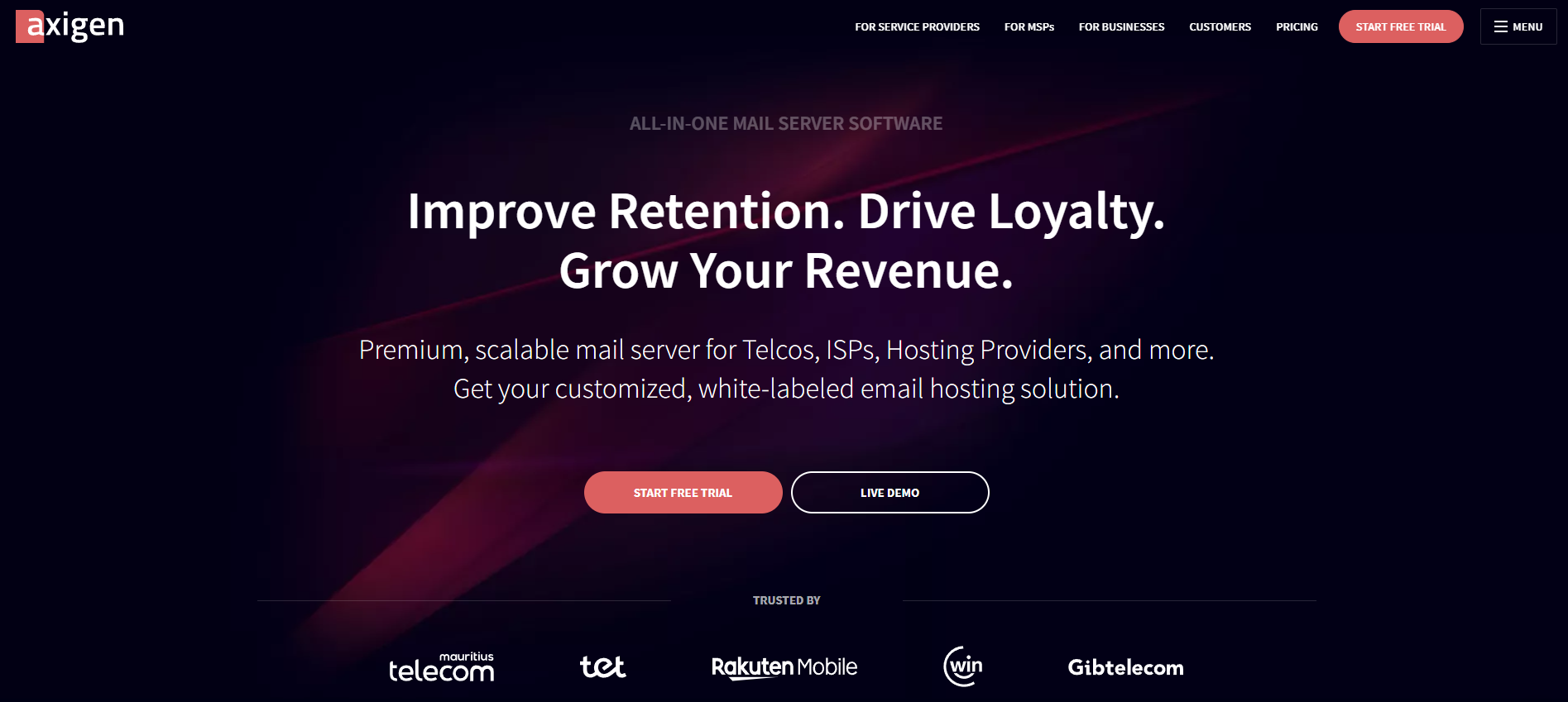
Axigen is a valuable introduction if you are looking for a rich and reliable email server solution. Axigen is an email and calendar server for Windows that is available for free. This platform, with support for up to 5 users for free, allows you to create any number of aliases without payment, send unlimited email messages, and enjoy complete control over your mailbox and settings. Axigen is not only available for Windows but also for Linux, serving as a popular email server with access to POP3, IMAP, and SMTP. In addition to providing a platform for digital communications and email management tasks, Axigen features include an email server management console, user accounts, backup and recovery tools, address book, calendar system, collaboration features, and customizable rules and filters.
Axigen emphasizes security, and it supports advanced email filtering and rule-based processing, as well as security features like SSL/TLS encryption and anti-spam and anti-virus filters.
Advantages:
- Providing a user-friendly and responsive web-based interface
- Scalable and suitable for small to large businesses
- Emphasis on security and offering features such as encryption, anti-spam, and anti-virus
- Flexible licensing options, including various versions to meet organizational needs and providing both paid and free versions
- ActiveSync Support
- Customization according to specific requirements
Disadvantages:
- Cost for advanced features
- Learning and using Axigen for novice email server administrators is complex.
- Limited third-party integrations
5. Apache James
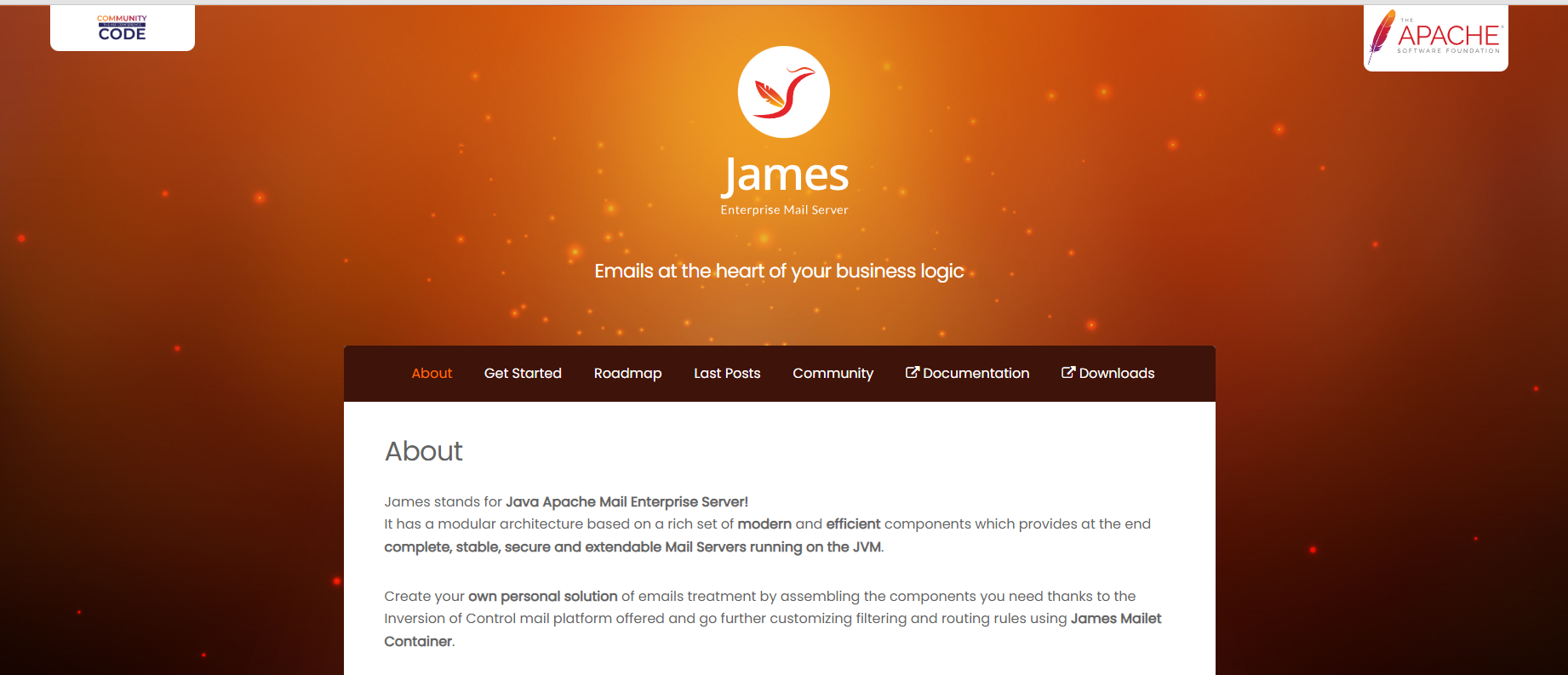
Apache James is a free email server option for Windows, as the name suggests, developed by the Apache Software Foundation, where James stands for Java Apache Mail Enterprise Server. This project is written in the Java language, is platform-independent, and can run on various operating systems that support Java. This portability and compatibility feature makes Apache James versatile and adaptable.
Apache James is designed based on a modular architecture, allowing users to add or remove modules according to their specific needs and extend and customize the server’s functionality. Apache James uses popular email protocols such as SMTP, IMAP, POP3, LMTP, and ManageSieve to ensure compatibility with a wide range of clients. Apache James includes a powerful SMTP server for sending and receiving emails, offering security enhancements such as authentication and encryption.
As Apache James is designed in Java, it can seamlessly integrate with other Java programs and frameworks. This makes Apache James a flexible solution for various use cases. Other features of Apache James include the Mailbox API, extendable email processing agents, and command-line admin.
Advantages:
- Open-source and flexible
- Compatible with various operating systems
- Modular architecture
- Scalable and suitable for small and large email systems
- Easy to use and manage
- Manageable through JMX, REST, command line
- Reliable and secure for communications and email exchange
- Supports protocols such as POP3, IMAP, and SMTP, as well as LMTP, ManageSieve, and JMAP
Disadvantages:
- Steeper learning curve
- Differences in community support and reliance on documentation and forums for assistance
- Limited third-party integrations
6. MailEnable
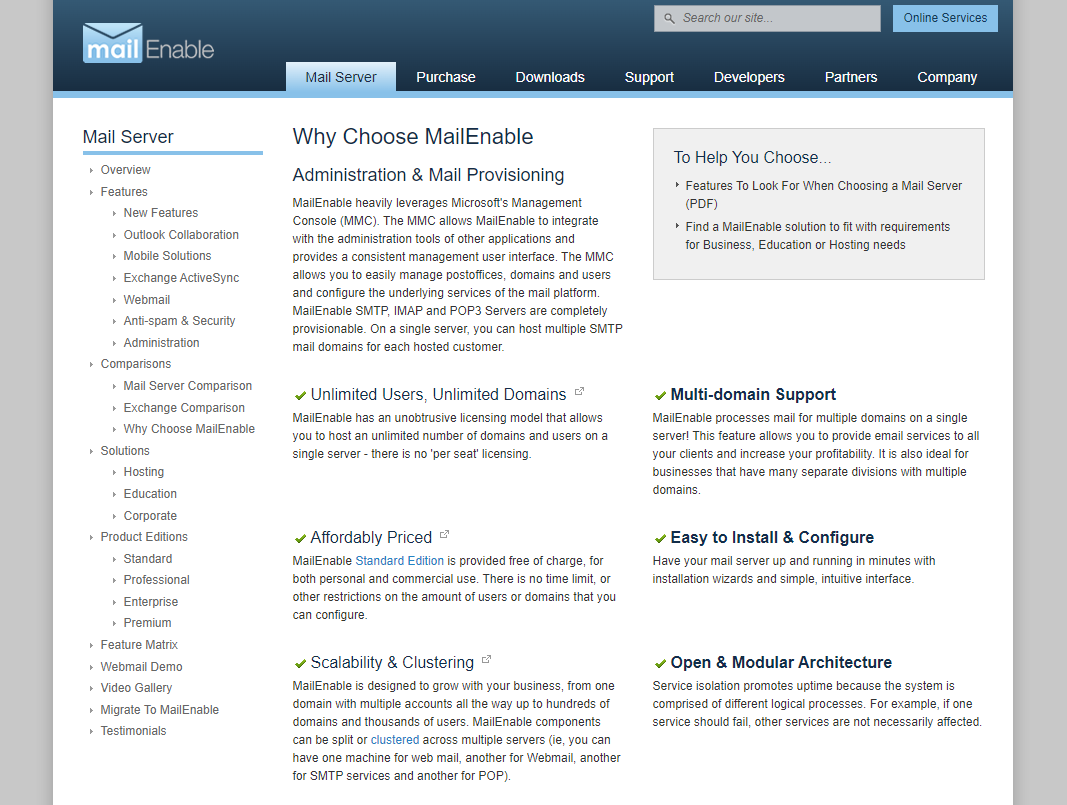
MailEnable is another popular email server software that provides email services for Windows operating systems. MailEnable meets the diverse needs of organizations by offering both free and commercial versions. While using the Mail server without incurring costs is a valuable advantage, it should be noted that the free versions have limitations compared to the paid versions and provide basic email functionality.
MailEnable hasthe features of an ideal Mail server and supports IMAP, POP3, Webmail, and SMTP services. It accommodates multiple domains on a single server, enabling the hosting of email services for various domains for organizations. Features such as an advanced AJAX webmail client for flexibility, a personal calendar, contacts, tasks, folders, auto signatures, and more make MailEnable a popular Mail server solution. MailEnable has a web-based interface for accessing email, calendar, and other collaboration features. This web interface is designed to be responsive and user-friendly, allowing users to access their emails from a web browser. It is particularly useful for users who need to review and manage their emails from different devices.
Like other Mail servers introduced in this article, MailEnable seamlessly integrates with different technologies and Windows-based services. It is suitable for organizations reliant on Windows infrastructure.
Advantages:
- Supports SMTP Authentication, Integrated Windows Authentication, Relay control
- Provides security features such as Anti-Spam, PTR record checking, DNS blacklisting, auto-banning of IP addresses
- Inline YouTube Player
- Supports SMTP, IMAP, and POP3
- Offers both free and commercial versions
- Scalability
- Flexible Webmail Interface
- Provides a web-based management console
- Easy management and configuration
- Supports personal calendar services for scheduling
Disadvantages:
- Dependency on Windows and lack of compatibility with non-Windows platforms
- Limited third-party integration
7. Zentyal
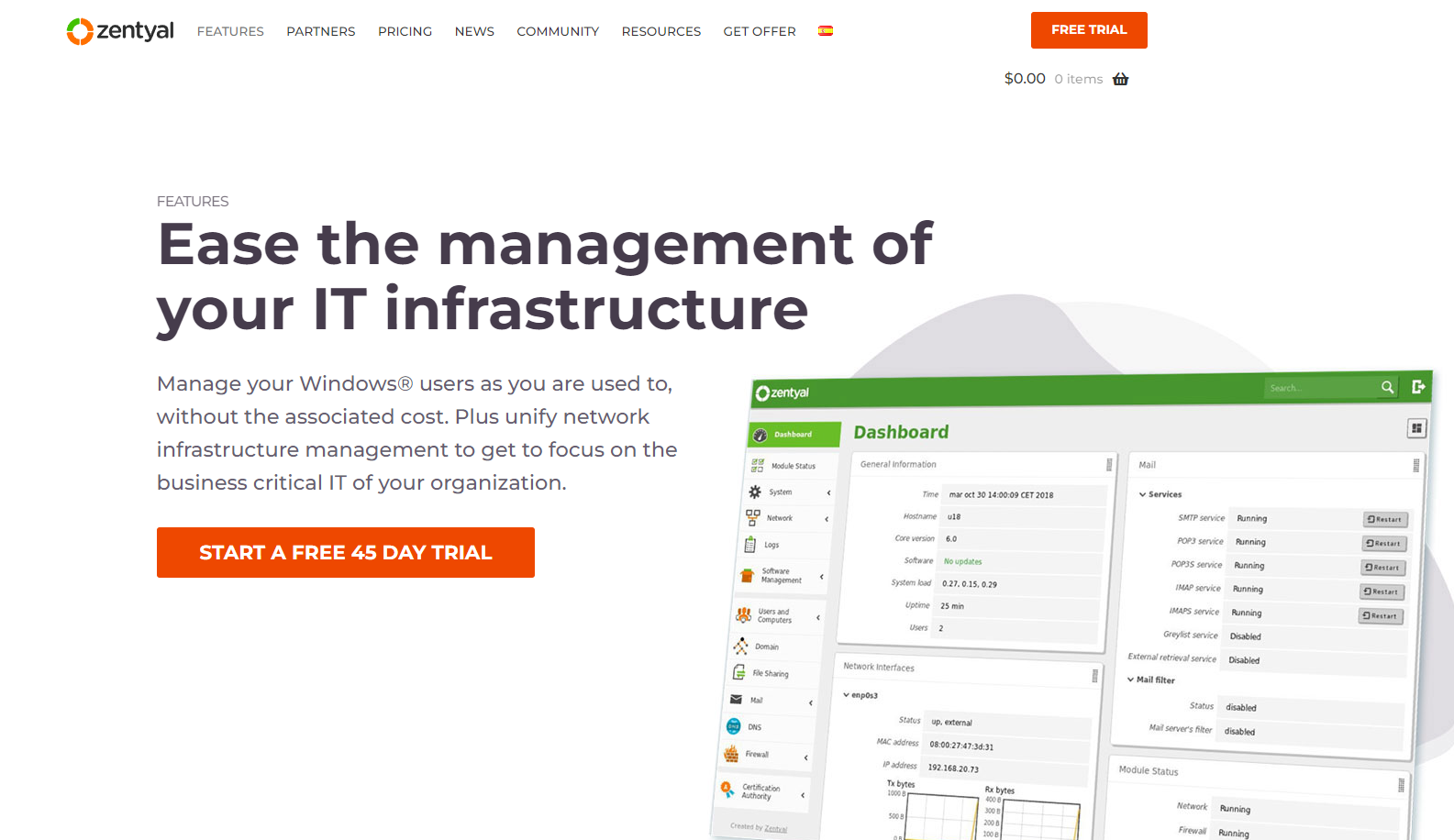
Zentyal is a powerful and feature-rich Mail server solution developed to simplify email service management and provide IT infrastructure with easy and cost-effective usability for small and medium-sized businesses. Zentyal is a comprehensive solution for organizations, with mail server functionality being one aspect of its services. As a Mail server, Zentyal supports protocols such as SMTP, POP3, and IMAP, allowing users to manage contacts, use the webmail interface, and securely send and receive emails.
Zentyal aims to provide an integrated and flexible solution for various IT services. In addition to mail services, it includes file sharing, directory services, firewall, VPN, and more. Zentyal takes security very seriously, considering the needs of businesses, and protects users from malicious emails by providing security features like antivirus and antispam filtering.
Advantages:
- Address Book for accessing contacts from the mobile
- Calendar and scheduling capabilities
- Providing internal CalDAV and CardDAV
- Cost-effective open-source solution for SMBs
- User-friendly web-based interface
- Facilitates the management of various server functions
Disadvantages:
- Limited scalability
- Dependency on the Zentyal ecosystem and facing challenges when integrating into an existing environment or adopting a more modular approach
- Weak support and updates
8. SmarterMail
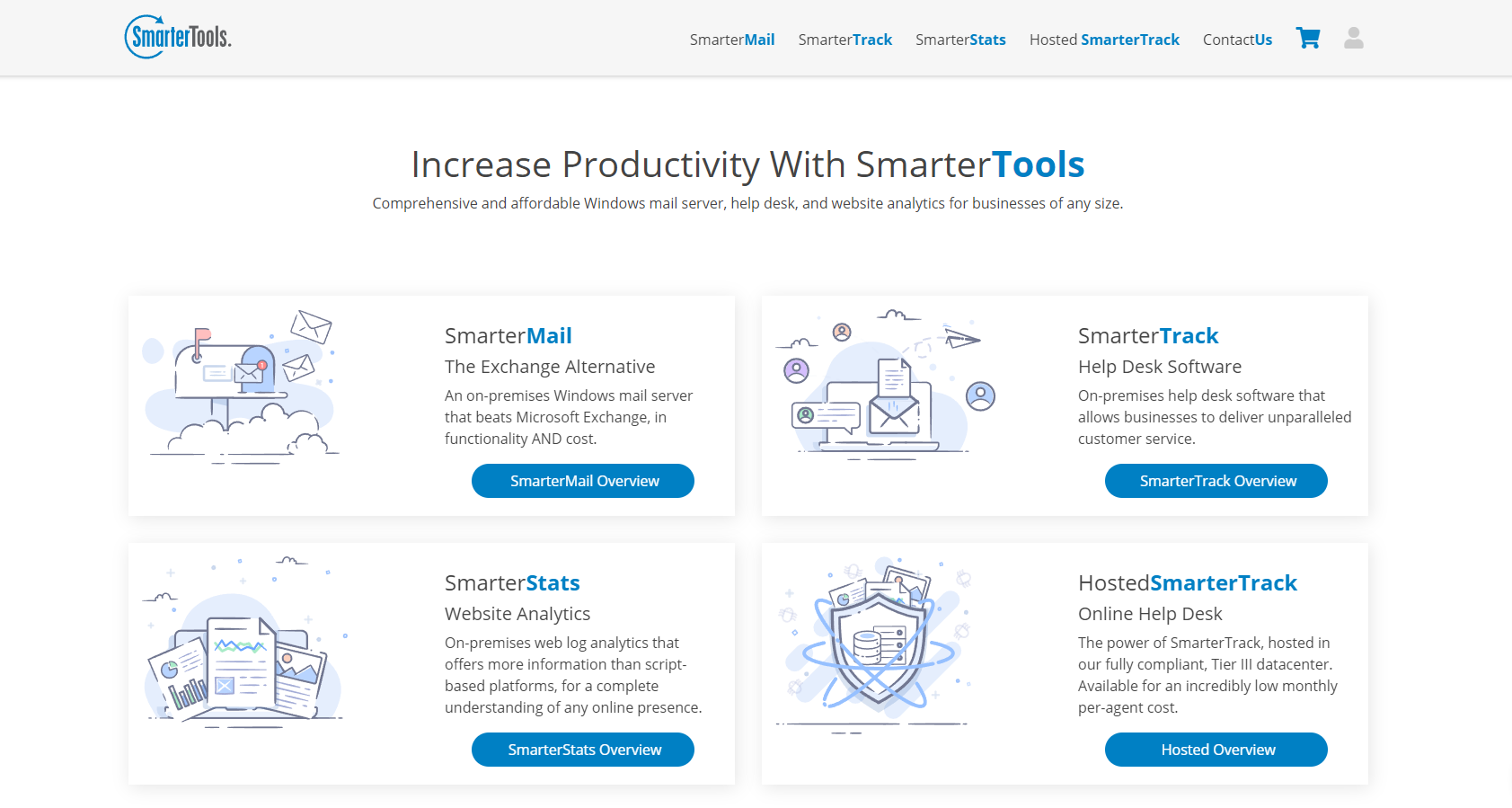
If you are looking for a popular Mail server solution and collaboration software for Windows, we recommend not to overlook SmarterMail. This program provides a comprehensive platform for email, calendar, and collaboration services for businesses and personal use. SmarterMail, as one of the best windows mail server platforms, offers powerful email features such as support for standard protocols, advanced email management tools (spam filtering, antivirus protection, and customizable folders), collaboration tools (calendars, tasks, notes, and chat), and security features (SSL/TLS encryption for secure communication, spam filtering, and antivirus protection). Due to these features, it has become a comprehensive solution for communication and collaboration within organizations.
SmarterMail supports Microsoft Exchange ActiveSync, allowing users to synchronize their emails, calendars, contacts, and tasks across multiple devices in real time. Additionally, SmarterMail is compatible with various platforms, including Windows, Linux, and macOS, providing flexibility in deployment.
One of the distinguishing features of SmarterMail compared to other mail servers is the provision of APIs for integration with third-party applications and services, enhancing its extensibility and collaboration capabilities.
Advantages:
- Web-Based Management
- User-Friendly
- Email Services with support for IMAP, POP3, and SMTP protocols
- Advanced email management features like spam filtering, antivirus protection, and customizable folders
- ActiveSync Support
- API Support
Disadvantages:
- Commercial product and paid solution with a pricing model based on the number of mailboxes
- Limited domain of third-party applications and services for integration
- Specific system requirements for use SmarterMail
9. Microsoft Exchange Server
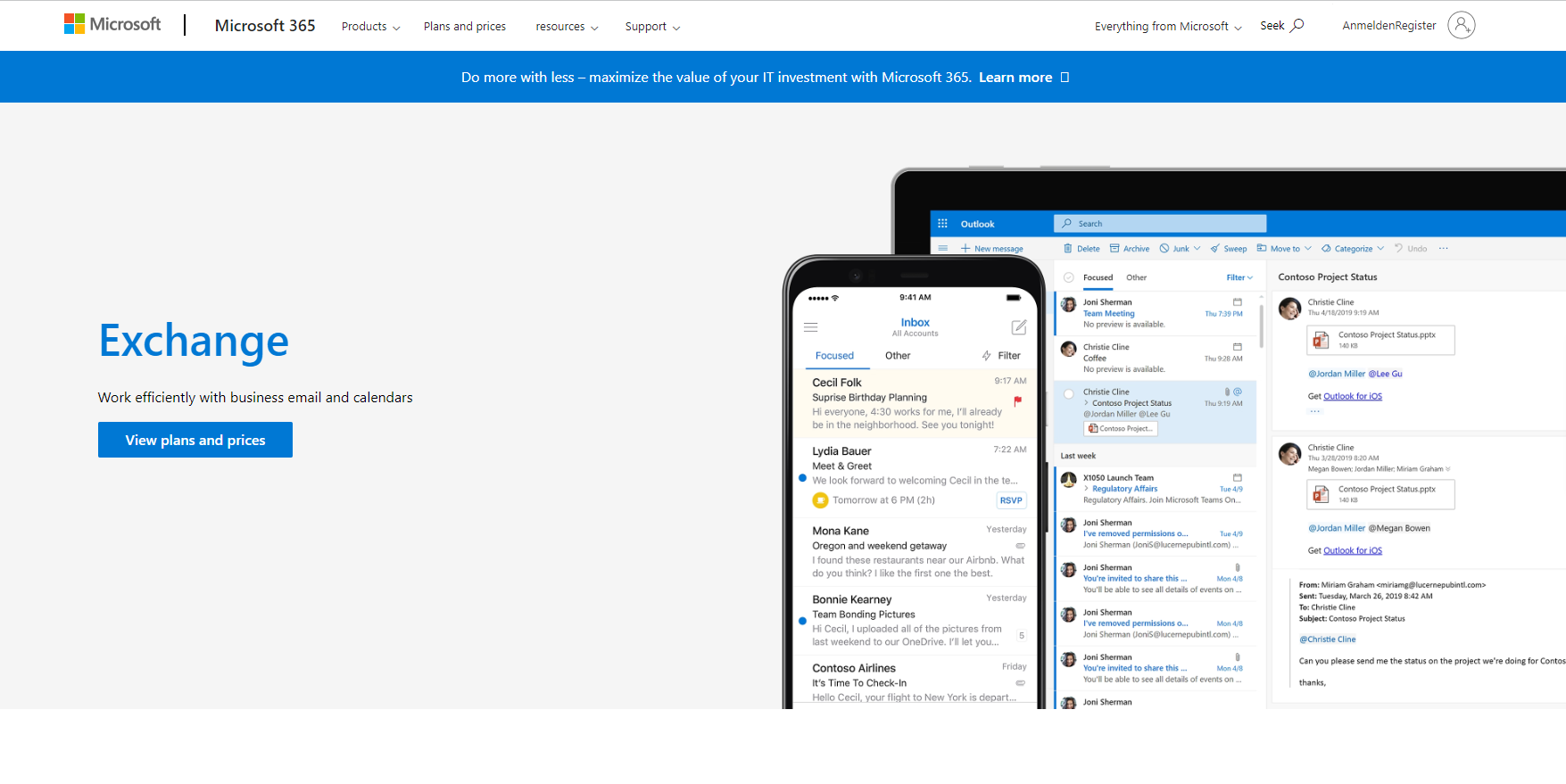
Microsoft Exchange Server is a widely used mail server for Microsoft users, extensively employed as an email and collaboration platform for businesses ranging from small to large. Microsoft Exchange Server, Developed by Microsoft, encompasses features such as email, instant messaging management, calendar, contacts, tasks, advanced email organization and management features, and top-notch organizational and managerial attributes. Microsoft Exchange Server is the best choice for organizations within the Windows ecosystem as it integrates seamlessly with Microsoft services and products, catering to specific needs. Precise integration with Microsoft Outlook provides rich email services and an excellent collaborative experience. Additionally, this platform enables organizations to deploy hybrid solutions and integrate on-premises Exchange with Exchange Online (Office 365) in a hybrid configuration.
Advantages:
- Enhances teamwork and communication by providing a comprehensive set of collaboration tools.
- Integration with Microsoft products such as Outlook, SharePoint, and Teams.
- Offers security features to protect against email-based threats and unauthorized access.
- Scalability.
- Management of contact information of persons and groups by providing contacts and address books.
- Supports synchronization with mobile devices for accessing email and collaboration tools, calendars, and contacts.
- Facilitates communication with the integration of voicemail and email.
Disadvantages:
- Significant costs for initial setup and licensing.
- Complexity in setting up and maintaining Exchange Server, requiring expertise.
- Dependency on Active Directory due to integration
- Requires regular maintenance.
- On-premises limitations and incompatibility with cloud-based solutions.
10. FirstClass
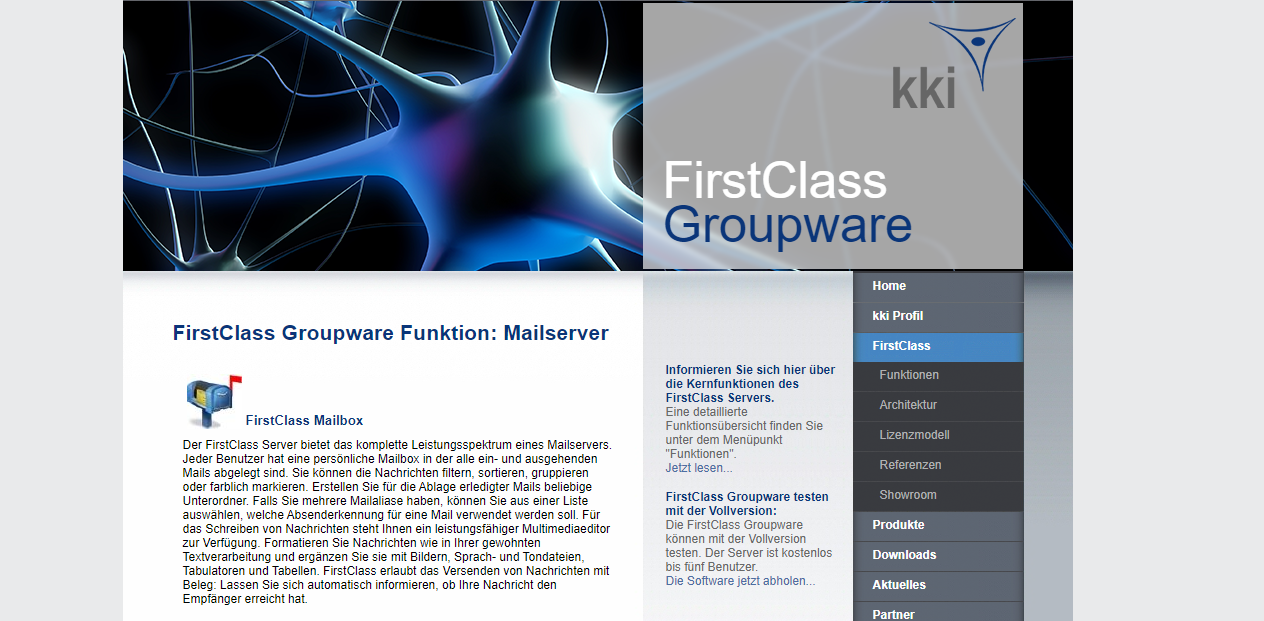
FirstClass is an all-encompassing communication and messaging platform that includes a mail server component. It is available for various operating systems, including Windows, although its availability for Windows may depend on a specific version. FirstClass offers beyond email services and it provides extensive and comprehensive collaboration tools, including messaging, conferencing, and file sharing, to enhance teamwork and communication. This platform seamlessly integrates various communication channels and supports content sharing to improve collaboration.
The most significant advantage of FirstClass is its ability to provide customization, allowing organizations to tailor the platform to their specific needs. FirstClass supports standard protocols such as IMAP, POP3, SMTP and implements security features like encryption, ActiveSync, SSL, and access controls to protect communications.
FirstClass is available for free for basic teamwork and communication management, but to access advanced features, you must use the paid Enterprise version.
Advantages:
- Comprehensive Collaboration
- Unified Communications
- Cross-Platform Support
- Rich Content Sharing
- Provision of Security Features such as encryption and access controls
- Customization based on specific needs
Disadvantages:
- Complex and challenging to learn
- It is not widely accepted compared to other email and collaboration platforms
- Restrictions in integration with third-party applications
- Requires more resources
- Necessitates active maintenance and support
- Significant costs for implementing and maintaining
Conclusion
Email servers cannot be disregarded for establishing a private email infrastructure as they constitute an essential part of the email system infrastructure, enabling the secure exchange of messages within the digital communication ecosystem. When selecting an ideal email server, factors such as necessary features, performance, budget, support options, and ease of use should be considered. For example, a large organization with hundreds of employees will need a powerful mail server to manage heavy traffic and support multiple users. Alternatively, based on your preferences, such as accessing the email inbox from any device or filtering spam, you should choose a mail server that meets your needs and includes more features than other mail servers. Budget is the most crucial factor in your decision, if you are a small organization, you should prioritize free mail servers.
This article introduces the most popular and best mail servers for Windows to save time and energy in researching and evaluating available mail servers. Prior to selecting a messaging and collaboration platform, assessing the compatibility, features, and support of platforms with your organization’s unique requirements will assist you in making an informed and appropriate choice for a suitable mail server. Rank the mail servers based on your organization’s requirements and choose the most suitable option.
We hope this article serves as a helpful guide to assist you in selecting your ideal mail server.